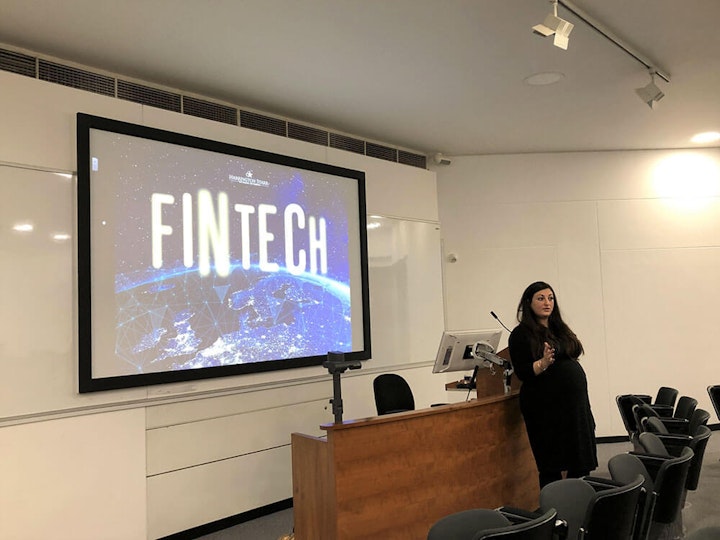Industry Insights - Working in FinTech with Nadia Edwards-Dashti
Nadia Edwards-Dashti (Founder and MD at the Harrington Starr Group, Winner - Investing in Talent 2019 Awards - Most Inspirational Rec Leader) was our ICMA Centre guest speaker on Wednesday 19 February.

Working in FinTech
Nadia gave us an insight into the world of FinTech, and what it is like to work there. While demystifying what work in this industry is like, Nadia shared her own journey and gave incredibly valuable advice to students.
The name of the session given by Nadia was 'Love the Journey' which came from the concept that a career specifically in FinTech doesn’t need to have an end goal because it can change every time with the speed of light. People should fall in love with day to day getting better. So, “if you love every second of the journey, the destination you get to is going to be a good one”.
The session was remarkably interactive and it started with breaking down the preconceptions about this industry by asking the audience three questions:
- How would you describe FinTech?
- What do you think it is like to work in FinTech?
- What does mental toughness mean to you?
A key point discussed in this session was that every problem is an opportunity in disguise. Accept your failures; they are excuses for you to get better and improve on your skills and become more resilient.
The FinTech journey is all about what’s next. You always need to think forward and anticipate trends, bring new innovations to the table, and that is a FinTech mindset because it is not only about what can I improve today, but also what I can continue to improve on! It is all about the journey and there is no end destination! And this is why for certain personality types, this industry is a perfect fit, while for others it is quite hard.
Talking about the journey, here is a brilliant interpretation!
J - Jobs (There are many jobs available on the market in FinTech)
O - Opportunity (There are many routes you can take to get to the job you want)
U - Understanding (Make sure you understand the company you are applying to, their business model, their culture, values, mission, purpose and projects)
R - Removing the middleman (Think about what could be your next idea, innovation and what could you do to really make a powerful impact on the company you are applying to; show your proactivity!)
N - Nuance (Think differently, what can you change in order to achieve better results? Be mindful of the present moment, the power lies within it and take advantage of the time and resources you have;
nuances: inspiration, teamwork, vision, analyze, develop, success;
Start training yourself to think on your feet!)
E - Expectations (Questions that might be asked in an interview can be of different types, such as:
- Competency based questions
- Experiential type questions
Show your respect to the business you are applying to because in FinTech, business becomes personal since it is their life and their idea!)
Y - You (Think about you! What do you want for you and what do you want from the company you are applying to?)
Finally, be aware that mindset is everything, it is what differentiates you and makes you stand out from the rest! So, make sure you develop your mental toughness and think big!
Cristina Marcu - Diversity Manager, Finance Society
